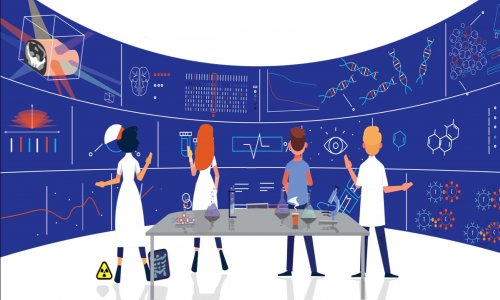Image source: Adobe Stock/Toowongsa
News • Appeal for better approval conditions
AI in personalised cancer medicine: “A fundamental change is needed”
Personalized therapies could improve the treatment of many diseases in the future. Cancer medicine in particular has made significant progress in recent years. Applications of artificial intelligence (AI) will allow to adapt personalised therapies in an even more targeted manner.
New, AI-based therapies require a flexible and safe legal framework, in order to reach patients quickly and safely. In the journal “npj Precision Oncology”, researchers from Dresden, Leipzig, Marburg and Paris provide an overview of possible AI-based applications for personalised cancer medicine and the associated regulatory challenges. They emphasize that the current rigid and slow approval requirements impede technological progress and argue for an adaptation of the existing regulations.
The current regulations are a de facto blocker to AI-based personalised medicine
Stephen Gilbert
The application of AI in precision oncology has so far been largely confined to the development of new drugs and had only limited impact on the personalisation of therapies. New AI-based approaches are increasingly being applied to the planning and implementation of personalised drug and cell therapies. Therapies can be adapted to individual patients’ needs – for example to improve efficacy and dosage, reduce toxicity, develop combination therapies and even personalise preclinical cell therapies regarding their molecular properties.
AI-based healthcare is developing continuously and with increasing speed. It can support doctors with decision-making and therapy planning as well as in early multi-cancer precision diagnostics. Other potential applications include the design of new types of personalised medical products, drug companion apps for patients and the use of so-called “digital twins”. The latter use patient data in almost real-time to enable more precise diagnosis by means of simulation and modelling and to adapt treatments to individual requirements. Advancing these products through regulatory pathways is enormously challenging. They combine technologies governed by different legal frameworks and regulatory bodies and are so novel that they are not well dealt with in current legislation. It can already be anticipated that the current approval conditions will make rapid clinical application difficult.
Recommended article

Article • Digitising healthcare
Virtual assistants and digital twins advance personalised medicine
Siri and Alexa are leading the way: the virtual assistants meet many daily needs. Soon, similarly programmed software and a ‘digital patient twin’, will be launched into the medical world – both IT applications based on Artificial Intelligence (AI). The virtual medical assistant and digital patient twin are two key aspects of a research project ‘Models for Personalised Medicine’.…
The publication identifies two large challenges: legislators and regulatory bodies underestimate the importance of the developing technologies in this area as well as the extent of required regulatory change to make approval processes more agile in the future. “The current regulations are a de facto blocker to AI-based personalised medicine. A fundamental change is needed to solve this problem,” says Stephen Gilbert, Professor of Medical Device Regulatory Science at the Else Kröner Fresenius Center for Digital Health at TU Dresden and University Hospital Carl Gustav Carus Dresden. The researchers therefore suggest, among other things, updating risk-benefit assessments for highly personalised treatment approaches. Solutions already established in the US could also be adopted in the EU for certain classes of low-risk decision support for doctors. The authors further suggest approaches to allow digital tools on market to be safety adaptable in a more flexible manner and to establish suitable test platforms for on-market monitoring. Multi-layered approaches would help to spread the load of oversight and make evaluation more relevant to patient safety.
Employees from the following institutions were involved in the publication: EKFZ for Digital Health at TU Dresden, University Hospital Carl Gustav Carus Dresden, Center for Scalable Data Analytics and Artificial Intelligence Dresden/Leipzig, Fraunhofer Institute for Cell Therapy and Immunology IZI (Leipzig), Institute for Clinical Immunology at University of Leipzig, University Clinic Marburg as well as the Université Paris-Saclay (Paris/France) and the life science consulting company ProductLifeGroup.
Source: Technische Universität Dresden
01.02.2024










